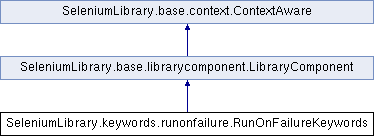|
| def | register_keyword_to_run_on_failure (self, keyword) |
| | Sets the keyword to execute when a SeleniumLibrary keyword fails. More...
|
| |
| def | assert_page_contains (self, locator, tag=None, message=None, loglevel='TRACE') |
| |
| def | assert_page_not_contains (self, locator, tag=None, message=None, loglevel='TRACE') |
| |
| def | debug (self, msg, html=False) |
| |
| def | get_timeout (self, timeout=None) |
| |
| def | info (self, msg, html=False) |
| |
| def | log (self, msg, level='INFO', html=False) |
| |
| def | log_source (self, loglevel='INFO') |
| |
| def | warn (self, msg, html=False) |
| |
| def | __init__ (self, ctx) |
| | Base class exposing attributes from the common context. More...
|
| |
| def | find_element (self, locator, tag=None, required=True, parent=None) |
| | Find element matching locator. More...
|
| |
| def | find_elements (self, locator, tag=None, parent=None) |
| | Find all elements matching locator. More...
|
| |
| def | is_element_enabled (self, locator, tag=None) |
| |
| def | is_text_present (self, text) |
| |
| def | is_visible (self, locator) |
| |
Definition at line 21 of file runonfailure.py.
◆ register_keyword_to_run_on_failure()
| def SeleniumLibrary.keywords.runonfailure.RunOnFailureKeywords.register_keyword_to_run_on_failure |
( |
|
self, |
|
|
|
keyword |
|
) |
| |
Sets the keyword to execute when a SeleniumLibrary keyword fails.
``keyword`` is the name of a keyword that will be executed if a
SeleniumLibrary keyword fails. It is possible to use any available
keyword, including user keywords or keywords from other libraries,
but the keyword must not take any arguments.
The initial keyword to use is set when `importing` the library, and
the keyword that is used by default is `Capture Page Screenshot`.
Taking a screenshot when something failed is a very useful
feature, but notice that it can slow down the execution.
It is possible to use string ``NOTHING`` or ``NONE``,
case-insensitively, as well as Python ``None`` to disable this
feature altogether.
This keyword returns the name of the previously registered
failure keyword or Python ``None`` if this functionality was
previously disabled. The return value can be always used to
restore the original value later.
Example:
| `Register Keyword To Run On Failure` | Log Source |
| ${previous kw}= | `Register Keyword To Run On Failure` | NONE |
| `Register Keyword To Run On Failure` | ${previous kw} |
Changes in SeleniumLibrary 3.0:
- Possible to use string ``NONE`` or Python ``None`` to disable the
functionality.
- Return Python ``None`` when the functionality was disabled earlier.
In previous versions special value ``No Keyword`` was returned and
it could not be used to restore the original state.
Definition at line 57 of file runonfailure.py.
◆ resolve_keyword()
| def SeleniumLibrary.keywords.runonfailure.RunOnFailureKeywords.resolve_keyword |
( |
|
name | ) |
|
|
static |
The documentation for this class was generated from the following file:

 Public Member Functions inherited from SeleniumLibrary.base.librarycomponent.LibraryComponent
Public Member Functions inherited from SeleniumLibrary.base.librarycomponent.LibraryComponent Public Member Functions inherited from SeleniumLibrary.base.context.ContextAware
Public Member Functions inherited from SeleniumLibrary.base.context.ContextAware Public Attributes inherited from SeleniumLibrary.base.context.ContextAware
Public Attributes inherited from SeleniumLibrary.base.context.ContextAware Properties inherited from SeleniumLibrary.base.librarycomponent.LibraryComponent
Properties inherited from SeleniumLibrary.base.librarycomponent.LibraryComponent Properties inherited from SeleniumLibrary.base.context.ContextAware
Properties inherited from SeleniumLibrary.base.context.ContextAware